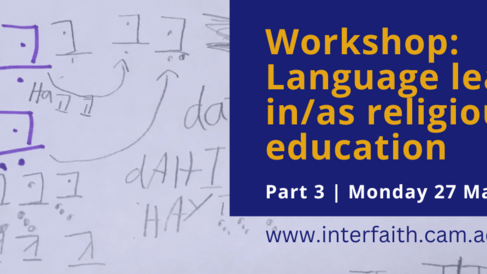to
Faculty of Divinity, Cambridge

About
Concluding our series on language learning in/as religious education, this afternoon workshop reflects on approaches, methods, and next steps in the research and teaching of religious languages.
The workshop will have contributions from scholars and educators who work with languages including Arabic, Hebrew, and Syriac. Across two panels, and with reference to other events in this series, we will discuss the core questions:
1. What have we learned about how and why people teach and learn religious languages?
2. What do we do with that learning? How does interdisciplinary discussion about such research impact our own work... as teachers and/or researchers?
As usual, we have identified extra questions to think about, whether you join us as an academic, practitioner, or someone otherwise engaged in questions of religious language and literacy. (See below.)
Who is this event for?
This workshop will be of interest to educators, researchers, and practitioners of religious languages and literacies. We welcome participation and insights from attendees drawing from their own experiences with religious languages and literacies.
This is a hybrid workshop hosted by the Cambridge Interfaith Programme at the University of Cambridge, and co-conceived by Dr Anastasia Badder (Cambridge) and Dr Jo-Ann Myers (Leo Baeck College).
Confirmed participants
Those engaging in the panel discussions will include:
-
Adel Mozammel – Darul Ihsan School, London
-
Dr Artanti Sari – Ohio State University & PGRI University Palembang, Indonesia
-
Prof Bene Bassetti – University of Modena and Reggio Emilia
-
Dr Daniel Weiss – Faculty of Divinity, University of Cambridge
-
Dr Nick Posegay – Faculty of Asian and Middle Eastern Studies, University of Cambridge
-
Prof Leslie Moore – Ohio State University
-
Prof Sharon Avni – Borough of Manhattan Community College (CUNY)
-
Yomna Helmy – Centre of Islamic Studies, University of Cambridge
-
Dr Jo-Ann Myers – Leo Baeck College, London
-
Dr Anastasia Badder – Faculty of Divinity, University of Cambridge
Registration
On site places will be limited. We ask those interested to register for remote participation (via Zoom) in the first instance. During the registration process, you may indicate if you would be interested to join those attending on site in Cambridge. We will contact interested persons if space is available. (The event is free to attend, but you will be responsible for any direct expenses such as travel.) NB The start and finish times for this event are to be confirmed. UK clocks change on 26 March, so all times are GMT+1.Also in this series
Webinar: Language learning in/as religious education (roundtable) February 2023
Webinar: Language learning in/as religious education - perspectives on progress November 2022, reported here.
Questions for reflection
- How can / should academics from different disciplines (e.g., anthropology, history) read theological approaches to religious language and literacy as ‘data’?
- How can different disciplines draw on theological concepts to better understand religious language and literacy practices?
- How might educators of religious languages draw on anthropological concepts and to what ends?
- How is our own thinking, researching, and teaching of religious languages shaped by readings of other disciplines?
- How does a personal connection to a religious language shape one’s study of that language?
- What do different methodologies allow us to understand about religious language? What do they assume? What might they preclude or prevent us from understanding?
- What space is there for interdisciplinary research of religious languages and literacies?
